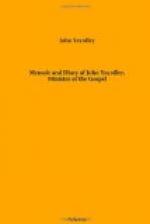4 mo. 24, 1820.
Thy affectionate letter I received with pleasure, though some parts of its contents penetrated the deepest recesses of my heart, and excited in me every tender sympathetic feeling of a brother and a friend.
I rejoice that thou hast found freedom to speak so candidly the undisguised language of thy heart; to me it seems like a voice from the dead, because I conceive it to be the voice of that awakened principle in thee which, as in many others, may have been held too long in captivity through the predominance of the surfeiting cares of the world. Whenever thou inclinest to unbosom to me thou mayest do it with freedom and in confidence, for, be assured, if thy complaints cannot meet with relief, they will at least meet with a welcome reception and a heartfelt condolence; for I could have no claim to the least of the Christian virtues, if I were destitute of a feeling regard for the sufferings of a friend, and especially a brother.
A few months afterwards he was again called upon deeply to sympathise with his brother. The occasion this time was the perplexity in matters of business in which Thomas Yeardley was involved. He expressed his feelings in a letter in which he not only gives the soundest Christian counsel, but also shows how he was himself indebted to the same maxims for the preservation of his honor and of his spiritual life and usefulness. The firm and practical manner in which the subject is treated render his remarks of permanent value.
Bentham, 8 mo. 7, 1820,
MY DEAR BROTHER,
Thy affectionate letter of the 24th I have received, and need not tell thee how sensibly I am concerned for thy present situation.
I do hope thou wilt not lose sight of the object thou hast now in view, to get relieved in some way from the excessive load of business which presses upon thee, for we can none of us carry fire in our bosoms too long without being burnt. We shall not be justified in the sight of Him with whom we have to do, if we do not endeavor to place ourselves in such a situation as will best answer the end for which he has designed us. It would convict us of a very weak and erroneous idea of a Supreme Being, to suppose that he could not or would not prosper our endeavors with equal success in a more restricted way of trade, when our motives are purely to serve him faithfully. Surely, He who cares for the sparrows will not suffer us to fall to the ground without his notice.
Thou wilt be ready to say it is an easy matter to speak of these things on paper; but believe me, my dear brother, I know a little of what I say. There was a time when I was as extensively engaged in business, according to my means, as you are now. I have had large sums of acceptances to provide for, with nothing towards them but what was in the uncertainty of the drapers’ hands. When I have set out on a journey I have had to take the distressing fear along with me, that if I failed




